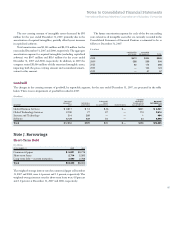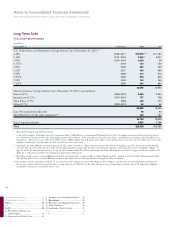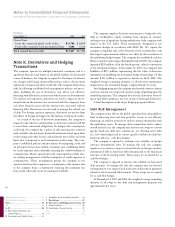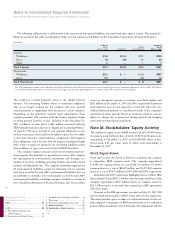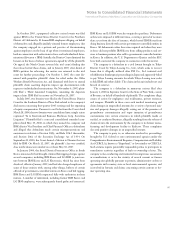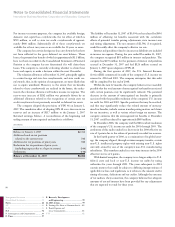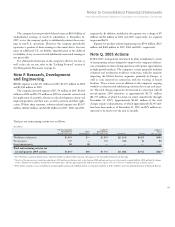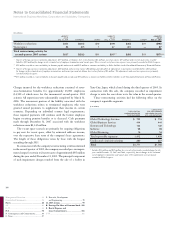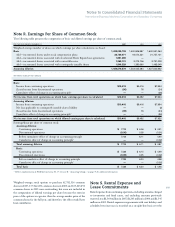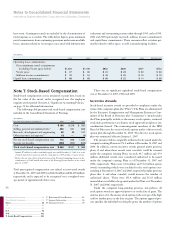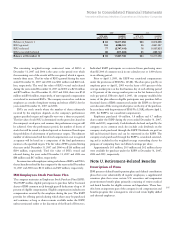IBM 2007 Annual Report Download - page 97
Download and view the complete annual report
Please find page 97 of the 2007 IBM annual report below. You can navigate through the pages in the report by either clicking on the pages listed below, or by using the keyword search tool below to find specific information within the annual report.95
Notes to Consolidated Financial Statements
International Business Machines Corporation and Subsidiary Companies
In October 2003, a purported collective action lawsuit was filed
against IBM in the United States District Court for the Northern
District of California by 10 former IBM employees alleging, on behalf
of themselves and allegedly similarly situated former employees, that
the company engaged in a pattern and practice of discriminating
against employees on the basis of age when it terminated employees,
both in connection with reductions in force and individualized deter-
minations (Syverson v. IBM). Initially, the District Court dismissed the
lawsuit on the basis of release agreements signed by all the plaintiffs.
On appeal, the Ninth Circuit reversed the trial court’s finding that
the release barred these claims, and in January 2007, after denial of
IBM’s petition for rehearing, the matter was returned to the trial
court for further proceedings. On October 3, 2007, the court dis-
missed with prejudice plaintiffs’ claim for relief under the Older
Workers Benefit Protection Act, and dismissed with leave to amend
plaintiffs’ claim asserting disparate impact age discrimination with
respect to individualized terminations. On November 6, 2007, plain-
tiffs filed a Third Amended Complaint, amending the disparate
impact claim. IBM filed its answer on November 26, 2007.
In July 2005, two lawsuits were filed in the United States District
Court for the Southern District of New York related to the company’s
disclosures concerning first-quarter 2005 earnings and the expensing
of equity compensation. Pursuant to an Order from the Court dated
March 28, 2006, the two lawsuits were consolidated into a single action
captioned “In re International Business Machines Corp. Securities
Litigation.” Plaintiffs filed a corrected consolidated amended com-
plaint dated May 19, 2006, in which they named the company and
IBM’s Senior Vice President and Chief Financial Officer as defendants
and alleged that defendants made certain misrepresentations and
omissions in violation of Section 10(b), and Rule 10b-5 thereunder,
and Section 20(a) of the Securities Exchange Act of 1934. On
September 20, 2006, the Court denied a Motion to Dismiss that was
filed by IBM. On March 12, 2007, the plaintiffs’ class was certified;
class notifications were mailed on or about May 30, 2007.
In January 2004, the Seoul District Prosecutors Office in South
Korea announced it had brought criminal bid-rigging charges against
several companies, including IBM Korea and LG IBM (a joint ven-
ture between IBM Korea and LG Electronics, which has since been
dissolved, effective January, 2005) and had also charged employees of
some of those entities with, among other things, bribery of certain
officials of government-controlled entities in Korea and bid rigging.
IBM Korea and LG IBM cooperated fully with authorities in these
matters. A number of individuals, including former IBM Korea and
LG IBM employees, were subsequently found guilty and sentenced.
IBM Korea and LG IBM were also required to pay fines. Debarment
orders were imposed at different times, covering a period of no more
than a year from the date of issuance, which barred IBM Korea from
doing business directly with certain government-controlled entities in
Korea. All debarment orders have since expired and when they were
in force did not prohibit IBM Korea from selling products and ser-
vices to business partners who sold to government-controlled entities
in Korea. In addition, the U.S. Department of Justice and the SEC
have both contacted the company in connection with this matter.
The company is a defendant in a civil lawsuit brought in Tokyo
District Court by Tokyo Leasing Co., Ltd., which seeks to recover
losses that it allegedly suffered after IXI Co., Ltd. initiated civil
rehabilitation (bankruptcy) proceedings in Japan and apparently failed
to pay Tokyo Leasing amounts for which Tokyo Leasing now seeks
to hold IBM and others liable. The claims in this suit include tort and
breach of contract.
The company is a defendant in numerous actions filed after
January 1, 2008 in Supreme Court for the State of New York, county
of Broome, on behalf of hundreds of plaintiffs. The complaints allege
causes of action for negligence and recklessness, private nuisance,
and trespass. Plaintiffs in these cases seek medical monitoring and
claim damages in unspecified amounts for a variety of personal inju-
ries and property damages allegedly arising out of the presence of
groundwater contamination and vapor intrusion of groundwater
contaminants into certain structures in which plaintiffs reside or
resided, or conducted business, allegedly resulting from the release of
chemicals into the environment by the company at its former manu-
facturing and development facility in Endicott. These complaints
also seek punitive damages in an unspecified amount.
The company is party to, or otherwise involved in, proceedings
brought by U.S. federal or state environmental agencies under the
Comprehensive Environmental Response, Compensation and Liability
Act (CERCLA), known as “Superfund,” or laws similar to CERCLA.
Such statutes require potentially responsible parties to participate in
remediation activities regardless of fault or ownership of sites. The
company is also conducting environmental investigations, assessments
or remediations at or in the vicinity of several current or former
operating sites globally pursuant to permits, administrative orders or
agreements with country, state or local environmental agencies, and
is involved in lawsuits and claims concerning certain current or for-
mer operating sites.


